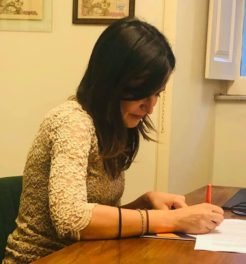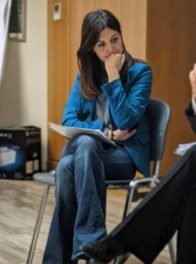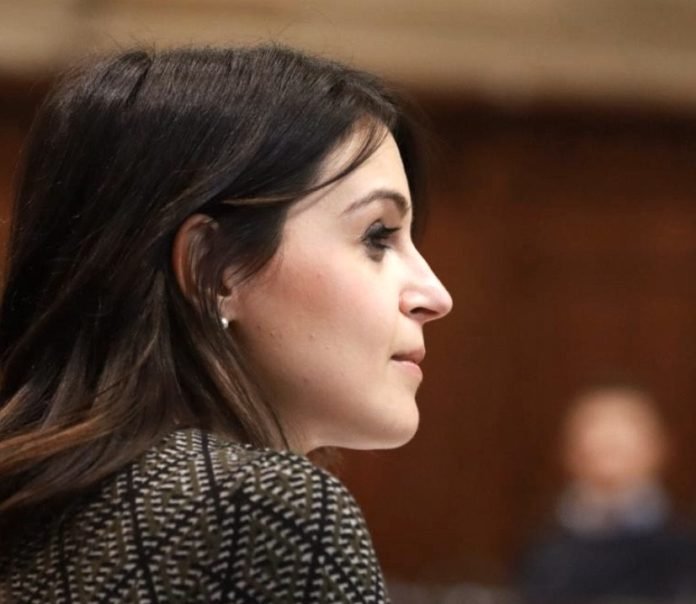ROME, FEBRUARY 11 – In 2016 Maria Cristina Pisani became the first woman to be elected spokeperson of the National Youth Forum, an organization representing over 80 associations and 4 millions young Italians, and three years later became its president. Representing the Italian government, 31 years old Maria attended meetings of the United Nations Economic and Social Council (ECOSOC) Youth Forum. She has been a member of the Scientific Committee of Urban Thinkers Campus-Right to the Future, an initiative of UN-Habitat conceived as an open space for critical exchange between urban actors who believe that urbanization is an opportunity and can lead to positive urban transformations. In her interview with OnuItalia she shares her experiences at the United Nations and at the National Youth Council, and offers her insights on the state of Youth empowerment and representation within Italian governmental institutions.
Could you tell us about your experience at Ecosoc and as a member of the Scientific Committee at the Urban Thinkers Campus: What were your main tasks and responsibilities?
As a representative of the Italian government at Ecosoc and as a member of the Scientific Committee of the Urban Thinkers Campus, I was able to give a voice to Italian Youth organizations, thereby allowing young people to be part of the decision-making process. These international meetings have been important opportunities for young people from all over the world to meet and share ideas, in order to build a greater momentum towards the implementation of the 2030 Agenda for Sustainable Development, the Addis Ababa Action Agenda and the Paris Climate Agreement.
We proposed to prevent violence against women through the creation of listening desks and meeting places for young women, to enhance the role of volunteering as a form of development and cooperation between the younger generations, to protect the quality of work -paying attention not only to the issue of youth unemployment, but also that of guaranteeing quality jobs- and to ensure new training models in developing countries. All of these proposals were made with the overarching objective of guaranteeing cooperation between states in catalyzing the processes of sustainable development and youth empowerment on a global level.

As in previous editions, the results of the Forum’s work were used in subsequent UN meetings, including the 2019 ECOSOC Session, the 2019 high-level Political Forum on Sustainable Development (HLPF), and for high-level events held on the margins of the opening of the General Assembly, such as the Climate Summit, the high-level Meeting on Financing for Development, and the SDG Summit. We focused on a number of SDGs and made recommendations for the implementation at a national, regional and global level of the following goals: ensuring an inclusive and equitable quality education and promoting lifelong learning opportunities for all; promoting inclusive and sustainable economic growth, full and productive employment and decent work for all; reducing inequalities within and between countries; taking urgent action to combat climate change and its impacts; promoting peaceful and inclusive societies for sustainable development; providing access to justice for all; and creating effective, accountable, and inclusive institutions at all levels.
What did it mean to be a young woman in these professional environments: what challenges -if any- did you face? Did you get the impression that young people, and more specifically young women, were given a chance to participate?
As a women, and therefore as someone bringing a female voice into these international contexts, I felt that my responsibility was even greater. Contexts of such importance, like those related to the UN, need people with great experience and technical skills. However, this has not prevented, in recent years, young people and women from seeing significantly increased opportunities for participation. For me, this shows a real guarantee of youth and women representation in the defining of global, common strategies. My experiences so far have only confirmed this belief.

What advice would you give to a young person who wishes to work for the UN or UN-related projects?
There are many young people who dream of international careers, especially in the United Nations. However, many of them believe that these goals are easy to dream of, but very difficult to achieve. The commitment we have made as the National Youth Council is to always fight for merit, so that this kind of opportunitiescan guarantee full growth from a human and professional perspective. Many of our young people know several languages and many have potential, skills and desire to do. To all of them I can only advise to continue to enhance their skills, and above all to believe in themselves. If you don’t believe you can get to the top, no one will do it for you! Specific skills will enable to work, at an international level, on important topics such as: education and training for sustainable development; non-formal education and transversal skills; the promotion of volunteering and active participation; the promotion of youth participation in decision-making processes, with particular attention to the inclusion of those who are in disadvantaged conditions; and the involvement of young people in building lasting peace through inclusive actions, the promotion of human rights and the dignity of the human being.
As President of the National Youth Council, what do you think about the empowerment of young people in Italy? Are young Italians given enough space and enough platforms to express their concerns and have an impact on Italy’s future?
On the one hand, interest in young people and in giving them enough opportunities – especially through social media- to express themselves has grown in recent years. On the other hand these processes are still not sufficient to ensure broad youth participation. Young people have a lot of ideas and specific skills, but often little chances of making their way in the areas they are really passionate about: this means that more and more young Italians are feeling excluded from the decisions that affect their lives today, but especially in the future. In occasion of our participation in the June 2020 “Stati Generali dell’Economia”, an initiative launched by the Italian government to gather ideas from social and economic interest groups, we had the opportunity to draw attention to the serious lack of youth representation in governmental institutions. We therefore tried to give a voice to the needs of young Italians by presenting proposals developed alongside youth associations, aimed at putting their interests at the center of the country’s strategic action. The National Youth Council is currently the only space for youth representation in Italy. To this end, we have proposed the establishment of a permanent working table, to ensure a stable and continuous form of participation and representation of young people in decision-making processes. Institutions need to work alongside the youth to ensure their active contribution to the democratic life of the country.
How has the Covid-19 pandemic impacted your work?
The Covid-19 pandemic has inevitably influenced the habits and activities of each of us, and revolutionised work contexts that are little accustomed to the modalities of smart working and agile working. Since the beginning, at the National Youth Council, we have moved all meeting online using the most popular digital platforms. There has never been a lack of material on which to work and debate, and throughout the pandemic our work has just intensified. This is because in extremely difficult times, like the ones we are living today, the most fragile parts of the population -the youth among them- face the greatest consequences. Our role in defending the needs of the Italian youth has gotten more concrete. The National Youth Council exists for this as well.
We have worked to fill the gap in youth participation and representation, and establish a stronger link between young people and policymakers. Every day, our efforts are aimed at ensuring that every voice is carried through in our actions and, consequently, that these voices influence the choices of those who govern us. I have high hopes for this generation and future generations, because we live in an increasingly cutting-edge world that is constantly innovating: only young people will truly be able to keep up. (@OnuItalia)

